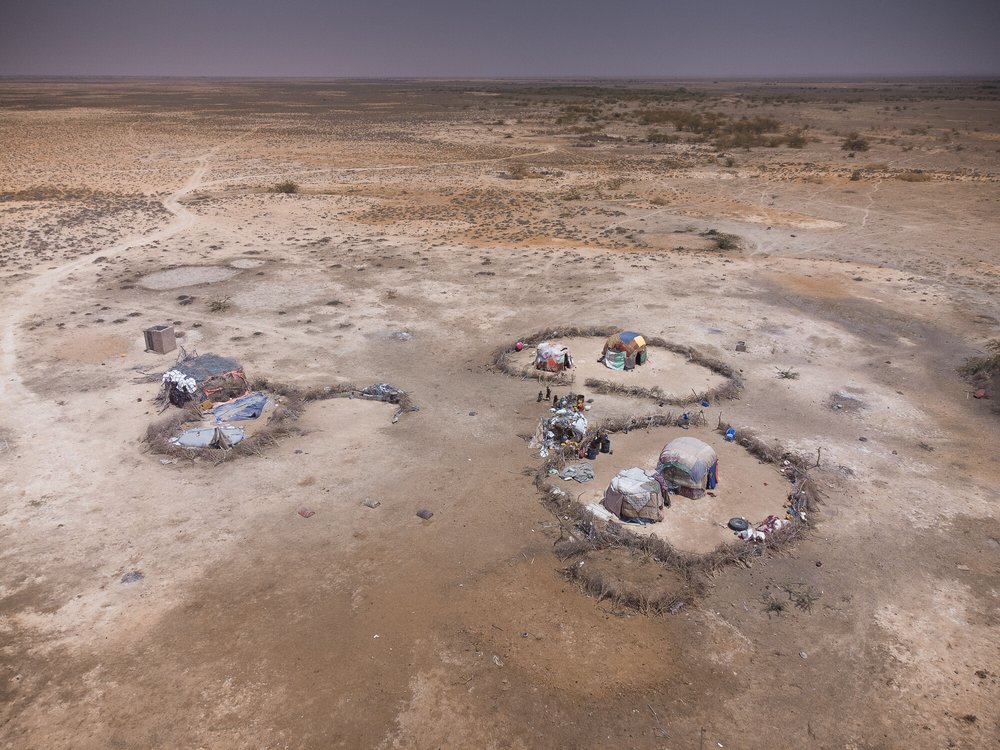Why famine means failure
By the time famine has been declared, often over half the deaths the crisis will cause have already happened. A declaration of famine would be a declaration of failure.
A homestead in Somalia. Image: Petterik Wiggers/Oxfam Novib

My name is Alicia and I’ve been co-leading our public campaigning work on East Africa for Oxfam since May last year.
In that time, we’ve seen the situation there get so much worse, yet the response from the UK government has not matched the urgency of the situation.
This crisis is a result of inaction, world leaders have the power to come together to provide the funding needed but that isn’t happening.
Kenya, Ethiopia, South Sudan and Somalia hunger crisis
Across Kenya, Ethiopia, South Sudan and Somalia, 29 million people face an unprecedented hunger crisis. The alarm has been sounding for months – but the response remains hugely underfunded.
It’s overwhelming. It can also seem like a really complex situation, and it is. So I wanted to share with you some answers to burning questions you might have.
What is causing East Africa to be on the brink of Famine?
Droughts and floods linked to climate change are destroying crops, livestock and livelihoods.
The conflict in Ukraine and Russia has contributed to soaring food prices. While ongoing conflict in the region and the global inequality crisis mean those already facing poverty are even more vulnerable.
This injustice is down to a deeply flawed system, a way of the world that chooses to prioritise the power and money of a thriving minority, while billions of us struggle to survive.
The wealth of billionaires continues to soar and fossil fuel companies see record profits. Yet poverty has increased for the first time in 25 years. People living in areas already vulnerable to climate change are left more exposed than ever to extreme weather and natural disasters.
What do world leaders need to do to avoid a Famine in East Africa?
The crisis has been chronically underfunded, despite warning after warning that a crisis was coming.
UN response plans were missing $3 billion last year, money which the rich countries of the world could have collectively put on the table.
In a world where billionaires' wealth grows by that amount every day, we don't think it's morally defensible to stand by while people starve.
Why should the UK get involved?
As one of the biggest historic polluters as well as one of the world’s richest countries, the UK has a moral responsibility to support people facing the impacts of climate change.
In 2017-18 the UK helped avoid famine during the region’s last hunger crisis by contributing £861 million.
But just five years later, when even more people in the region are facing famine, the UK has committed just £156 million for humanitarian aid.
This is nowhere near enough. They’ve also failed to provide the amounts for next year.
World leaders seem to be waiting for an official declaration of famine before committing more funds, but why?
Right now, there is simply not enough political pressure on world leaders to push them to take action and provide funds for East Africa.
This crisis has often been called the forgotten crisis, which can be the way with a slow onset crisis.
Sadly, with many crises happening around the world, Leaders’ attention gets funnelled into other emergency situations where the crisis is moving quickly, which in turn gets the media coverage and public attention which creates pressure on them to act.
Too often leaders wait for an official famine declaration, which in some instances doesn’t come because of the political implication for that country’s Government. Or they come too late as the data comes after the crisis. We know that this choice to delay will cost thousands of lives.
Even one person dying for lack of something as basic as food is indefensible.
For famine to be looming across an entire region in 2023 is obscene. This situation is getting worse, all because those with the most power, money and influence, fail to take action. With the necessary funding and early action, famine can be avoided and early deaths can be prevented.
If Famine is declared, what does that mean?
Essentially, a declaration of famine means that starvation is causing an extremely high number of deaths within the population. But by the time famine has been declared, often over half the deaths the crisis will cause have already happened. Here's a few stats that need to be met.
For an official famine declaration:
- 1 in 5 households must be experiencing an extreme lack of food
- More than 30 percent of people are severely malnourished
- Two in every 10,000 people die from starvation each day
And, that is why Famine is a failure.
How can world leaders be waiting for this before they cough up the funds that could make a difference?
People in East Africa cannot control climate change, they cannot control conflict or the greed of billionaires, they can only control how they react to it day to day.
World leaders can take action to mitigate the devastating impact of these issues on the lives of so many.
Is there enough money though?
We are told there isn’t enough money, but a wealth tax for the UK’s 0.01% richest would raise nearly £23 billion a year.
To wait for an official famine declaration is a political choice.
I truly believe that unjust choices are being made right now about the East Africa Crisis, and that needs to stop now.
What is Oxfam doing?
- Oxfam is supporting local partners across Kenya, Somalia, Ethiopia and South Sudan, to provide cash, water, and essential hygiene kits.
- We’re supporting communities to become more resilient to extreme weather.
- And working with local partners to provide training and tools for sustainable farming.
"The people are the most affected by the drought because they become displaced and life becomes hard." Ali Shire Omar, Somalia. Pablo Tosco / Oxfam Intermón
The people are the most affected by the drought because they become displaced and life becomes hard.”
Ali Shire Omar, a farmer in Somalia who has been learning sustainable farming methods.
Does campaigning really make a difference though?
People power makes a difference.
Using your voice to speak out, sharing why an issue matters to you and putting pressure on decision makers is what helps us to create change.
Over the years, our campaigning work has helped to create policy changes and has protected government aid money that otherwise would have been cut.
We've even heard first hand from people behind the scenes in government about moments campaigners have changed the course of events.
So, we know that the work that goes into our campaigns – the stunts, the press releases, the petitions, the supporters’ meetings with MPs (and the list goes on!) – has made a real difference and forced the Government to step up their efforts.
For me this is why now, more than ever, we need to continue to step up our effort and to show the government that there is support for this issue and that we need them to act.
What can I do today to stand in solidarity with the people in East Africa?
World leaders know famine can be averted and unnecessary deaths can be prevented.
A declaration of famine would be a declaration of failure; failure to act, failure to prevent and a failure to the people of East Africa.
We can’t sit by and wait for the government to act. We need to work together to build awareness about what’s happening in East Africa and stand with families and communities in Kenya, Ethiopia, South Sudan, and Somalia.
Can you share the petition with your friends and family? The more people who sign our petition the better we can demonstrate that this is an issue that the UK public really cares about and the more pressure we can put on the Government to provide the urgently needed funding. We’re running out of time and really need to act now.
A massive thank you for taking the time to read this blog, and for all your support to the campaign. We really cannot achieve change without you.
More posts like this
